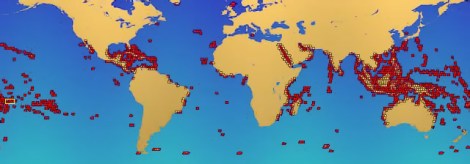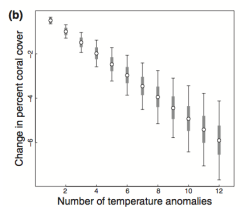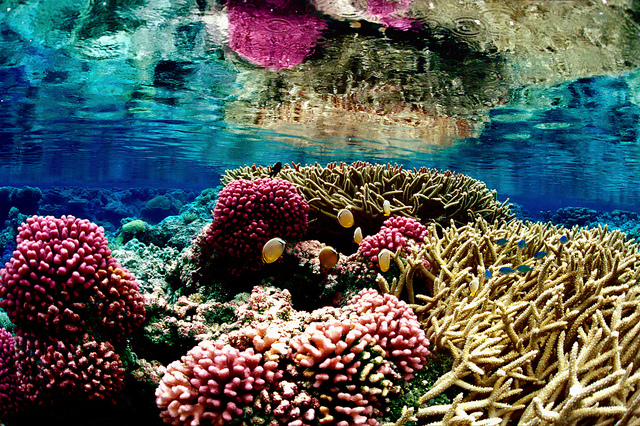
Photo by Jim Maragos/U.S. Fish and Wildlife Service.
There’s a reason people focus on the preservation of coral reefs. They’re an oddity (animals that look and behave like plants), a beauty (see photo above), and a ecological asset (reefs are enormously diverse ecosystems). The world has thousands of reefs in various sizes and at various levels of health.

Image courtesy of NASA.
And, according to a new study, they are all at enormous risk due to climate change.
For years, researchers have examined the expected impact of global warming on the reefs. Overfishing and pollution have long been identified as stressors for coral, with some scientists arguing that those factors are more critical threats. But a new study from researchers at Florida Institute of Technology suggests that coral has been decimated by warmer waters before.
The research from doctoral student Lauren Toth and advisor Richard Aronsen, published this week in Science, involved taking core samples from reefs, boring an aluminum pipe into dead reefs off the coast of Panama (nice work if you can get it). When they extracted the samples, they were surprised to find that two-and-a-half millennia of expected growth was missing.
From Science Daily:
“We were shocked to find that 2,500 years of reef growth were missing from the frameworks,” said Toth. “That gap represents the collapse of reef ecosystems for 40 percent of their total history.” When Toth and Aronson examined reef records from other studies across the Pacific, they discovered the same gap in reefs as far away as Australia and Japan.
Toth linked the coral-reef collapse to changes in ENSO. ENSO is the climate cycle responsible for the weather conditions every few years known as El Niño and La Niña events. The timing of the shutdown in reef growth corresponds to a period of wild swings in ENSO. “Coral reefs are resilient ecosystems,” said Toth. “For Pacific reefs to have collapsed for such a long time and over such a large geographic scale, they must have experienced a major climatic disturbance. That disturbance was an intensified ENSO regime.”
Marine ecologist John Bruno explains the correlation to climate change.
This finding indicates that, as we know from paleoecological studies of earlier eras, our modern coral reefs are supremely sensitive to subtle changes in climate even in the absence of local impacts like fishing and pollution.
In other words, in contrast to what has been argued in a number of high profile essays (also in Science magazine), reefs do not have to be overfished and polluted to be harmed by climatic fluctuations. And the findings of Toth et al. are very much concordant with a growing body of literature indicating that local management does not measurably reduce the impacts of climate change on reefs.

Bruno also notes the chart at right from a study that he co-authored, “Temperature-driven coral decline: the role of marine protected areas.” Over increasingly broad confidence intervals, there is a direct correlation between temperature variance and decrease in coral cover.
Bruno summarizes:
Everyone agrees that overfishing, particularly the depletion of predators from coral reef ecosystems, is an enormous, global problem. But the current science indicates that this problem is largely unrelated to the climate change problem. We urgently need to tackle both problems simultaneously and with equal vigor and commitment. Unfortunately, solving one will not negate the other.
The report’s authors are more sanguine about the prospect of recovery, as indicated in an interview with Discovery.
“The real message here is that corals do have the resiliency to recover,” said Richard Aronson, a coral reef ecologist and paleobiologist at the Florida Institute of Technology in Melbourne. “It happened 1,500 years ago after 2,500 years of nothing, so it could happen again.
“But the other side is that many reefs are already damaged,” he added. “To make reefs recover, we have to do things to address greenhouse gas emissions to mitigate and reverse climate change. And we have to address local threats, like clear-cutting of forests, which sends sediment and nutrients into the water.”
In summary: The bad news is that coral reefs will likely be devastated by climate change-related ocean temperature shifts. The good news is that they’ve demonstrated their resiliency in the past.
And then, more bad news: In the past, the oceans got cooler again. Saying that preserving coral means we simply have to address greenhouse gas emissions is like saying that to preserve the Earth from its eventual annihilation by an expanding Sun, we need simply to move out of our existing orbit.
Theoretically possible. But I wouldn’t put a bet on it.



